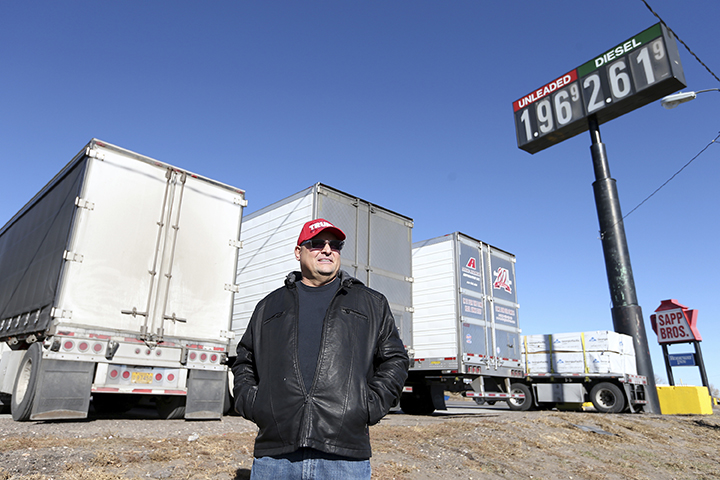CHEYENNE, Wyo. — While many Wyomingites’ experiences during the pandemic have been shaped by state- or county-level reactions, truck drivers in the area have been exposed to a patchwork of responses across the nation.
Situated at the nexus of Interstates 25 and 80, Cheyenne is a popular stop for truckers hauling goods across the U.S. Truckers who stop in Wyoming’s capital city could be headed to any state in the country, and with that comes the chance to observe stark regional differences.
Perhaps no period in recent memory has revealed those regional differences more than the past nine months. Since March, the nation has grappled with conflicting views on how to address the COVID-19 pandemic, which has so far claimed the lives of more than 275,000 Americans, according to the Centers for Disease Control and Prevention.
“State by state, things were so different,” said Hamilton Byrd, a longtime Cheyenne resident who drove semi-trucks up until the middle of last summer, when he quit to pursue his event business full-time.
“There were places that were really strict that had statewide mask mandates way back in April. With corporate entities, you’d see the same thing, too. You’d show up to a Love’s Travel Stop in Wyoming, for instance, and it feels like business as usual. Then you’d show up to a Love’s in California, and it feels like a different world,” he said.
“That was one really interesting observation I had — just seeing how diced up we all were,” said Byrd. He also noted that, from his view, truck stops — like airports or bus depots — are places where people from all over the country — including virus hotspots — congregate.
“These were hotspots or relatively volatile areas,” Byrd said. “When you jump into one truck stop that has no care in the world, it was nerve-racking.”
Vicente Lopez, who owns True Grace Farm and Truck in Cheyenne and has driven trucks since 1987, said it’s never been difficult to keep to himself on the road, adding that he’s not particularly concerned about the threat of the virus as it is.
However, in some areas, he did encounter regulations so strict is affected his life on the road, the Wyoming Tribune Eagle reported.
“I anticipated getting my shower and everything when I got up in the morning, and they had shut down their showers,” Lopez recalled about a truck stop he stayed at in Louisiana. “I wasn’t able to get my shower the next morning. That was tricky.”
Sheila Foertsch, managing director of the Wyoming Trucking Association, said a lot of truckers encountered similar issues at the onset of the pandemic.
“Early on, drivers who go coast to coast were having difficulties finding places to park and rest, as well as difficulty finding places to eat. A lot of states closed restaurants, and that included dine-in truck stops,” Foertsch said. “But the truck stops did a good job of pushing back and saying that they need to be open — even if it’s in a modified capacity — to serve food to essential workers.”
One the pandemic’s biggest effects on the trucking industry, Foertsch said, has been the type of goods truckers are transporting.
“Everyone involved at the beginning of the pandemic that was transporting medical supplies and groceries became very busy, but if you weren’t hauling that kind of stuff, you might have seen a slight downturn in business because of the closings,” she said, noting that Wyoming was less affected because it never fully closed restaurants.
Rather, the downturn in the energy industry — which has been caused by reduced travel during the pandemic, the collapse of coal and the Saudi-Russia oil price war — has most affected Wyoming truckers’ profits.
“You have trucks transporting equipment for both the coal mines, as well as oil and gas. You have transportation of fuel that goes into the mines and the rigs,” Foertsch said. “Any kind of energy downturn is reflected in the trucking industry.”
Booie Bears, a Wellington, Colorado-based trucker who frequently drives through Cheyenne, said about 80% of his business was geared toward hauling oil and gas industry products prior to the pandemic.
“When COVID-19 came, the price of oil went way down. The pandemic didn’t just shut down our society, it shut down whole industries. Oil and gas seemed like it stopped overnight,” said Bears, who was forced to lay off several of his employees as a result.
“I had to scramble and try to find different avenues to diversify the company,” he said, noting that he’s shifted to hauling commodities, such as corn and wheat, as well as consumer products sold by Amazon. The rise in remote working, too, has affected the products Bears’ company has been transporting during the pandemic.
“Aside from commodities and household goods, a lot of people are moving from bigger cities to smaller states or cities to try to save money or downsize their homes,” he said. “We’ve pulled a lot of moving trailers.”
Bears is hopeful that his business will rebound as the pandemic subsides, but he’s not sure when that will happen.
In the meantime, driving across the country in 2020 has shown him the same reality Byrd and Lopez noticed on their routes: Concern over the virus varies dramatically, depending on where you stop.
“You could go up into Wyoming or Montana or South Dakota in the middle of the pandemic and still sit down in a restaurant and eat a meal,” Bears said. “It seems like there’s a line drawn in the sand when you hit Colorado and the Southwest. Everything was totally shut down. You couldn’t even get fuel without a mask.”
Story by Kathryn Palmer, Wyoming Tribune Eagle
The Associated Press is an independent global news organization dedicated to factual reporting. Founded in 1846, AP today remains the most trusted source of fast, accurate, unbiased news in all formats and the essential provider of the technology and services vital to the news business. The Trucker Media Group is subscriber of The Associated Press has been granted the license to use this content on TheTrucker.com and The Trucker newspaper in accordance with its Content License Agreement with The Associated Press.













